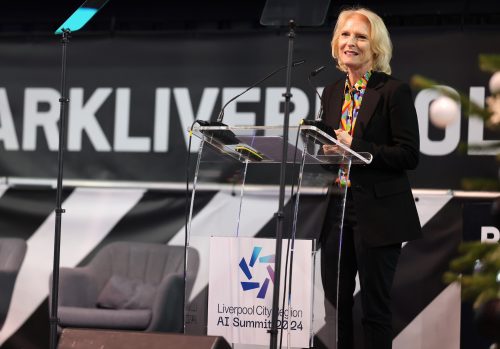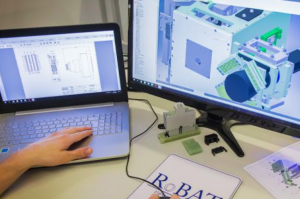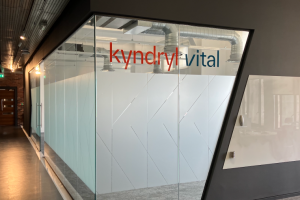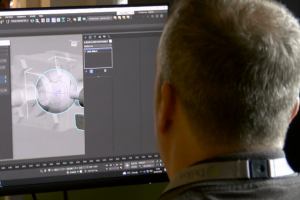Government backs city’s stance on harnessing economic benefits of AI

The Government has hailed Liverpool City Region’s leadership in harnessing AI to improve lives and drive economic growth.
The city region held an international AI Summit this week, and in a video message Peter Kyle, Secretary of State for Science, Innovation and Technology, said the Government would support communities across the country to follow the Liverpool City Region’s example of harnessing AI to grow the economy, create jobs, attract investment and improve lives for local people.
He said: “Together we can shape the future of this technology to build a fairer, safer, more prosperous society for everyone.”
Hosted by multilingual interactive digital humans, the summit brought together the brightest minds in AI, including global industry leaders, cutting-edge researchers, and innovative local businesses, who highlighted how Artificial Intelligence is being used to solve real-world challenges – from transforming healthcare to revolutionising education – and how it can drive a fairer, more inclusive society.
The landmark event also showcased Liverpool City Region’s world-leading Artificial Intelligence expertise, while addressing ethical issues and setting out an inspiring vision for the future of ‘AI for Good’ in the UK.
Keynote speaker, IBM UK and Ireland CEO, Dr Nicola Hodson, told delegates we were in “one of the most transformational periods in human history” in which “tech is moving faster than it ever has, but slower than it ever will”.
She said: “It is clear we are moving from AI hype to AI reality,” adding that “AI is augmenting – not replacing – human intelligence”.
Hailing from Widnes, the former University of Liverpool student, now techUK Deputy President and Department of Science, Industry and Technology board member, said “We have a huge AI opportunity in the Liverpool City Region and beyond. The economic promise of AI continues to grow as adoption accelerates.
“There is little doubt we are already in the age of AI. According to McKinsey, AI could add $4.4 trillion of value annually to global GDP by 2030. Just to put that into perspective, in just six years from now, the AI industry will be worth nearly double the value of the UK’s economic output of 2023.
“And the UK’s own AI industry is expected to grow to £800bn by 2035, according to UK Government research. With a 20% growth rate, Liverpool is the fastest-growing city economy in the UK – and this area is well set to become a leader in responsible AI.”
She said IBM was working with the University of Liverpool to drive research on AI, big data and High-Performance Computing and this year the partnership had delivered AI assistants to accelerate chemical discovery.
Meanwhile, the STFC Hartree Centre at Daresbury had helped develop AI that makes breast cancer analysis 25 times faster and AI software that predicts bowel cancer with 92% accuracy.
But she added AI needs the right governance and guardrails, with ethics, fairness and reliability essential and with the right tools in place to ensure data is managed, trusted and secure.
Liverpool City Region Mayor Steve Rotheram signed a Memorandum of Understanding at the summit between the Combined Authority, the University of Liverpool and the UK’s Science and Technology Facilities Council.
The agreement is to develop Meta Liverpool, created from sources such as high resolution drone footage and transport models, and which allows the impact of policies to be tested before being deployed.

AI Summit Liverpool
Mayor Rotheram said: “Today hasn’t just been about showcasing cutting-edge technology – it’s been about showing the world what the Liverpool City Region is all about – innovation with heart, technology with purpose and a vision of progress that leaves no one behind.
“Artificial intelligence is a perfect example of this. Not the fancy algorithms – or shiny tech bit – but because, with the right guardrails in place, it can empower us to solve real problems, improve people’s lives, and build a fairer, more equitable society.”
He added: “At Alder Hey Children’s Hospital, AI is helping doctors diagnose illnesses faster, giving our kids the best chance of recovery. At the Hartree Centre, we’ve got the UK’s most powerful industrial supercomputer, driving breakthroughs in manufacturing, climate science, and more. And at the University of Liverpool, AI is helping us create new materials at record speed – transforming industries from renewable energy to healthcare.
“But the real value of innovation isn’t just the technology it creates – it’s about its impact on people too. We’re part of a groundbreaking pilot programme, one of the largest, not just in England but in Europe, bringing cutting-edge AI to schools across our area.”
He said: “During the pandemic, the region’s Civic Data Cooperative helped make Liverpool a pioneer in mass Covid testing, showing how AI can save lives. And with our new Life Sciences Investment Zone, we’re expecting £800m of investment and around 8,000 new jobs in health innovation.”
Among thre speakers were Marina Tcharnetsky, Chief Business Development Officer at the Artificial Intelligence Centre Hamburg (ARIC) and Prof Mark Thompson, co-founder of the high profile California-based Psi-Quantum, one of the world’s leading quantum computing companies with its only European base in the Liverpool City Region.
The summit, held in BOXPARK Liverpool, is expected to spark collaborations and drive new ideas about how AI can support the UK’s wider ambitions to be at the cutting edge of ethical technology.








